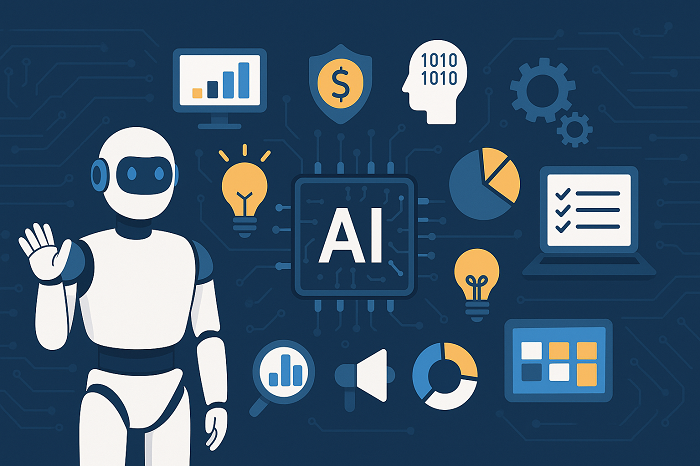In today’s rapidly evolving digital landscape, artificial intelligence is no longer a futuristic concept reserved for tech giants. Businesses of all sizes are leveraging AI tools to streamline operations, enhance customer experiences, improve decision-making, and gain a competitive edge. From automating repetitive tasks to providing powerful insights, AI has become a cornerstone of modern business growth. For entrepreneurs, startups, and established companies alike, choosing the right AI solutions can transform productivity and profitability. In this article, we will explore the top 10 AI tools every business should use, covering what makes each tool unique and how it can support sustainable growth.
Why AI Tools Are Essential for Businesses Today
The business world is increasingly data-driven. Companies that once relied solely on manual processes now face the challenge of managing massive amounts of data while maintaining efficiency. AI tools help bridge this gap by automating data analysis, predicting trends, personalizing customer experiences, and even generating content. Beyond efficiency, AI helps businesses stay agile, reduces operational costs, and minimizes human errors. Most importantly, it allows decision-makers to focus on strategy and innovation instead of getting caught up in repetitive work.
Top 10 AI Tools Every Business Should Use
1. ChatGPT for Customer Support and Content Creation
ChatGPT has revolutionized the way businesses interact with customers and produce content. It can handle customer queries instantly, write blogs, draft marketing copy, and even generate product descriptions. By integrating ChatGPT into customer service platforms, businesses can provide 24/7 support without overburdening human agents. Content marketers also use ChatGPT to brainstorm ideas, draft engaging posts, and optimize messaging for different audiences, making it a versatile AI tool.
2. Jasper for Marketing Copy and Branding
Jasper is designed specifically for marketing professionals who want to generate high-quality ad copy, emails, landing pages, and brand messaging. It helps maintain a consistent brand voice while creating persuasive text that converts readers into customers. Businesses save time and money by using Jasper to accelerate campaign development while maintaining professional quality.
3. Grammarly for Communication and Writing Enhancement
Clear communication is vital in business, and Grammarly ensures all written communication is polished and professional. From internal emails to client proposals, Grammarly checks grammar, tone, readability, and plagiarism, making sure every piece of content reflects the business’s credibility. Its AI-powered tone suggestions also help companies maintain appropriate communication with diverse audiences.
4. HubSpot CRM for Sales and Customer Relationship Management
HubSpot CRM integrates AI to optimize sales pipelines, track customer interactions, and personalize marketing campaigns. It provides predictive lead scoring, suggesting which prospects are most likely to convert, while also automating repetitive tasks like data entry. Businesses using HubSpot CRM benefit from streamlined communication, better forecasting, and stronger customer engagement.
5. Salesforce Einstein for Predictive Analytics
Salesforce Einstein brings the power of AI to customer relationship management by delivering predictive analytics and actionable insights. It helps sales teams prioritize leads, improves customer segmentation, and supports service teams with recommendations tailored to individual customers. By embedding AI directly into Salesforce, companies can make smarter decisions without needing additional integrations.
6. Hootsuite Insights for Social Media Monitoring
In the digital age, social media is a critical channel for building brand reputation. Hootsuite Insights, powered by AI, enables businesses to track social media mentions, analyze sentiment, and identify emerging trends. This helps companies respond quickly to customer feedback, monitor competitor activity, and adjust their strategies in real-time for maximum impact.
7. Canva AI for Design and Visual Content
Canva AI empowers businesses to create visually stunning designs without needing professional graphic design skills. From marketing posters and infographics to social media content, Canva’s AI-driven features make design accessible to everyone. The tool offers templates, design suggestions, and even AI-generated graphics, ensuring that businesses maintain a strong visual identity across platforms.
8. Zoho Analytics for Data-Driven Decisions
Zoho Analytics uses AI to simplify complex data analysis, allowing businesses to turn raw data into meaningful insights. The platform generates reports, identifies patterns, and provides predictive forecasts, helping companies make informed decisions. With easy integration into multiple apps, Zoho Analytics is especially valuable for small to medium-sized businesses that want powerful analytics without heavy costs.
9. Pictory for Video Content Creation
Video has become one of the most engaging forms of content marketing, and Pictory helps businesses produce professional-quality videos with minimal effort. Its AI converts written scripts or blog posts into compelling video content, complete with voiceovers, captions, and visuals. For businesses looking to expand into video marketing without hiring expensive production teams, Pictory is a game changer.
10. Trello with AI Integrations for Project Management
Managing multiple projects and teams can be overwhelming, but Trello’s AI integrations make the process more efficient. AI features help prioritize tasks, predict project timelines, and automate workflow updates. For businesses that value collaboration and organization, Trello enhances productivity and ensures projects are delivered on time with fewer bottlenecks.
How to Choose the Right AI Tools for Your Business
Selecting AI tools depends on your business goals, budget, and existing workflow. Start by identifying problem areas where automation could save time or reduce errors. For example, if customer support is overwhelming, AI chatbots can provide immediate relief. If data analysis is a challenge, an analytics platform like Zoho Analytics or Salesforce Einstein can unlock valuable insights. Always ensure the chosen tools integrate smoothly with your current systems to avoid disruptions.
Conclusion
Artificial intelligence is reshaping the future of business by making operations smarter, faster, and more customer-focused. The top 10 AI tools we explored—from ChatGPT to Trello—cover essential areas such as communication, marketing, analytics, and project management. Whether you run a startup or manage a large corporation, adopting these tools can lead to greater efficiency and long-term growth. Businesses that embrace AI now will not only stay competitive but will also position themselves as leaders in the digital-first economy.
Frequently Asked Questions (FAQs)
Q1. What are the benefits of using AI tools in business?
Answer. AI tools save time, reduce costs, improve accuracy, and help companies make data-driven decisions. They also enhance customer experiences and allow employees to focus on strategic work instead of repetitive tasks.
Q2. Do small businesses need AI tools?
Answer. Yes, AI tools are not just for large enterprises. Small businesses can benefit from affordable AI platforms that automate marketing, manage customer relationships, and analyze data, giving them a competitive edge.
Q3. Which AI tool is best for customer service?
Answer. ChatGPT and Salesforce Einstein are both excellent for customer service. ChatGPT provides instant responses and conversational support, while Salesforce Einstein offers predictive recommendations for service teams.
Q4. Can AI replace human employees?
Answer. AI is designed to assist rather than replace human employees. It automates repetitive work but still requires human oversight for strategy, creativity, and relationship-building.
Q5. How do I know which AI tool is right for my company?
Answer. Evaluate your pain points, such as time-consuming tasks, customer management, or data analysis. Choose tools that align with your needs, integrate well with your existing software, and offer scalability as your business grows.




